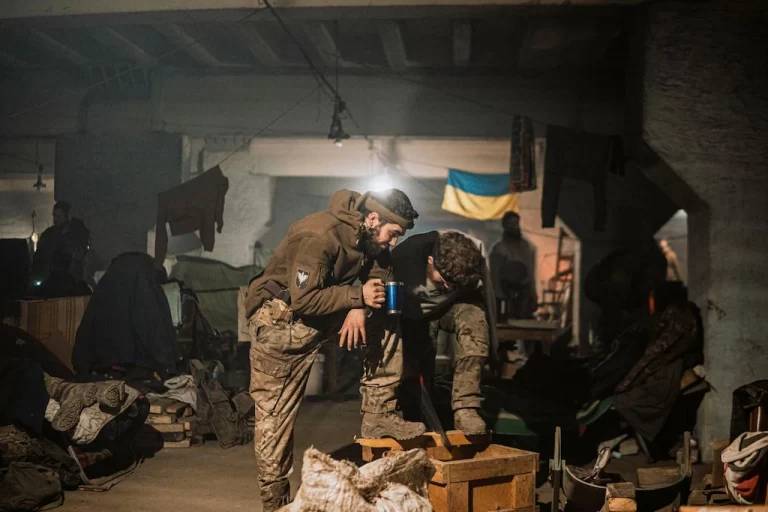Russian troops bombarded a riverside city on Friday in what appeared to herald a major assault to seize the last remaining Ukrainian-held territory in a province Moscow claims on behalf of separatists.
Ukrainian officials said Russian forces had launched a massive artillery bombardment against Sievierodonetsk, one of the last Ukrainian-held bastions in Luhansk, one of two southeastern provinces Moscow and its proxies proclaim as independent states.
The city, and its twin Lyshchansk on the opposite bank of the Siverskiy Donets river, form the eastern part of a Ukrainian-held pocket that Russia has been trying to overrun since mid-April after failing to capture the capital Kyiv.
“The Russian army has started very intensive destruction of the town of Sievierodonetsk, the intensity of shelling doubled, they are shelling residential quarters, destroying house by house,” Luhansk governor Serhiy Gaidai said on his Telegram channel.
“We do not know how many people died, because it is simply impossible to go through and look at every apartment,” he said.
Ukraine’s general staff said it had pushed back an offensive on Sievierodonetsk, part of what it described as major Russian operations along a stretch of the frontline.
Despite losing ground elsewhere in recent weeks, Russian forces have advanced on the Luhansk front, in what some military analysts view as a major push to achieve scaled-down war aims of capturing more territory claimed by pro-Russian rebels.
“This will be the critical next few weeks of the conflict,” said Mathieu Boulegue, an expert at London’s Chatham House think tank. “And it depends on how effective they are at conquering Sievierodonetsk and the lands across it.”
In Moscow, Russian Defence Minister Sergei Shoigu said the “liberation of the Luhansk People’s Republic” would be over soon.
Ukrainian President Volodymyr Zelenskiy described the conditions in the Donbas, which includes Luhansk and neighbouring Donetsk province, as “hell” and said the region had been “completely destroyed” by Russia.
VICTORY
Capturing Luhansk and Donetsk would allow Moscow to claim victory after it announced last month that this was now its objective. It achieved a major step towards that goal this week, when Ukraine ordered its garrison in the main Donbas port, Mariupol, to stand down after a near three-month siege.
Russia’s Shoigu said around 2,000 Ukrainian fighters had surrendered so far at the huge Azovstal metalworks.
Kyiv has not confirmed how many fighters have surrendered, but Britain gave the first official Western confirmation that a large Ukrainian force had laid down arms, estimating the number at around 1,700. An unknown number were still believed to be inside, it said.
Zelenskiy said on Friday Ukraine’s military command had given the defenders a clear signal that they could come out and save their lives, and he expected all to be out within days.
In a video, the commander of the Azov Battalion, a Ukrainian unit that had defended the plant, confirmed the order to stop fighting was being implemented, and said all civilians and wounded fighters were now out.
The dead were being removed from underground tunnels and bunkers, said the commander, Denys Prokopenko: “I hope that in the near future, relatives and Ukraine will be able to bury their soldiers with honour.”
Natalia Zarytska, wife of an Azovstal fighter who surrendered, said she had not heard from him since a 10-minute message exchange on Telegram two days ago. She believed he was still alive and would one day return home.
“The situation is really hard and horrible and my husband is on the way from one hell to another hell, from Azovstal steel plant to a prison, to captivity,” Zarytska said in Istanbul, where she and other family members lobbied Turkey to try to help save the fighters.
The Red Cross says it has registered hundreds of Ukrainians who surrendered at the plant as prisoners of war, but has given no firm numbers. Kyiv says it wants to arrange a prisoner swap. Moscow says the prisoners will be treated humanely, but Russian politicians have been quoted as saying some must be tried for crimes or even executed.
NEXT PHASE
Russian forces in Ukraine have been driven in recent weeks out of the area around Ukraine’s second largest city Kharkiv, their fastest retreat since being forced out of the north and the area around Kyiv at the end of March.
But they still control a large swathe of the south and east, and the end of fighting in Mariupol means that territory is now largely unbroken. Ukraine says Russia aims to impose its own administration and could try to annex occupied territory.
Still, military analysts say Russia has been using up its firepower against an underestimated foe, and may be running out of resources to achieve its aim of capturing the whole Donbas.
“Nothing is set yet. But it will be very much the next phase … before the Kremlin must freeze positions on the ground and stop advancing and shift to positional warfare,” said Boulegue, the Chatham House expert.
In a sign of Russia’s aim to boost its war effort, the parliament in Moscow said it would consider a bill to let Russians over 40 and foreigners over 30 join the military.
The past week has seen Sweden and Finland apply to join NATO, though Turkey has threatened to block the move, accusing the Nordic countries of harbouring Kurdish militants.
After weeks of threatening to retaliate, Putin appears to have mostly climbed down, saying this week Finnish or Swedish NATO membership did not represent a threat unless the alliance sends new weapons or troops. Nevertheless, Defence Minister Shoigu said on Friday Moscow planned to beef up its forces nearby in response to what he called new threats.
Russia’s gas export monopoly Gazprom said it would halt shipments to Finland from Saturday for failing to pay in roubles, a measure it has already taken against Poland and Bulgaria.
Reuters



No comments yet
Be the first to share your thoughts!